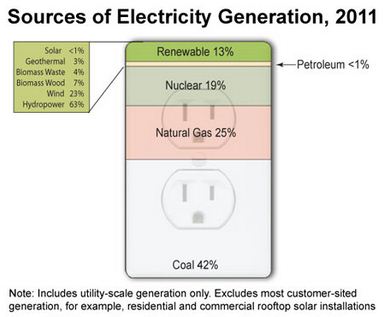Automobiles, CO2, and Global Warming
SEARCH BLOG: ENVIRONMENT
Some thoughts about the costs of global warming, transportation, and the environment.
- Hydrogen powered vehicles would be the cleanest environmentally and neutral regarding CO2 production (for those who subscribe to the IPCC concerns).
The issues with hydrogen power are:1. Large amounts of electricity are needed to produce sufficient hydrogen power to power the world's fleet of vehicles. The only viable alternative for producing large amounts of CO2-free electricity is nuclear power and the concern for nuclear waste disposal make this a politically incorrect choice among environmentalists.
2. The infrastructure to distribute hydrogen does not exist which means that the spread of a hydrogen-based transportation system would be decades away.
3. May be significantly more costly over the life of the vehicle than a small, gasoline-only powered vehicle. - Hydrogen fuel cells are an alternative to hydrogen gas and do not require a new distribution system.
Issues with hydrogen fuel cells are:1. The fuel cells require additional amounts of electricity from the electric power grid thereby increasing CO2 production from that source (unless created from nuclear power).
2. The fuel cells degrade and must be replaced over time.
3. They may be significantly more costly than a small gasoline-only engine for the operating life of the vehicle. - Ethanol powered vehicles would reduce the need for oil and would reduce some of the CO2
Issues with ethanol are:1. It is environmentally unfriendly when burned, releasing numerous smog producing gases.
2. It is agriculturally disruptive and has been the cause of widespread deforestation worldwide as countries attempt to clear land to produce crops that can be used in the production of ethanol.
3. It is economically unsound because it requires subsidies to make it competitive with oil products while, at the same time, increases the price of crops such as corn, causing hardship among poorer people for whom corn is a staple in their diet.
4. It is significantly less efficient as a fuel than gasoline which means more of the fuel must be burned than gasoline to travel the same distance. - Gasoline/Battery hybrid vehicles offer the promise of improved fuel efficiency, thereby reducing CO2 production for the miles driven.
Issues with gasoline/battery hybrid vehicles:1. They require large battery "packs" which much be replaced and require recycling or disposal of "dead" batteries which may not be environmentally "friendly."
2. They are much more costly than a small gasoline-only engine for the operating life of the vehicle and only improve overall mileage and total fuel consumption marginally. - Gasoline/Electric/Battery hybrid vehicles offer the promise of substantially improved fuel efficiency, thereby reducing CO2 product for the miles driven substantially over present vehicles.
Issues with gasoline/electric/battery hybrid vehicles:1. Battery technology for "plug and play" cars is not sufficiently advanced for production.
2. They may be more costly than a small gasoline-only engine for the operating life of the vehicle.
3. They require additional amounts of electricity from the electric power grid thereby increasing CO2 production from that source (unless created from nuclear power).
4. They require large battery "packs" which much be replaced and require recycling or disposal of "dead" batteries which may not be environmentally "friendly."
Those who believe that climate end is nigh see no economic cost as too high to eliminate CO2 production from our lifestyles. For them, pick your alternative and buy it. For most, they will be forced to pay significantly more for the "risk management" of possibly adverse effects of global warming.
If they live in the north where during the last month they have experienced well below normal temperatures and, in some areas, overwhelming amounts of snow... that might be a hard sell... even though those who adhere to the belief of CO2 mono-causal global warming say that abnormal cold temperatures are caused by global warming. And abnormal warm temperatures. And more hurricanes. And less hurricanes. And less ice. And more ice.
Locally... it's a really hard sell.
| Month | Avg. High | Avg. Low | Mean |
| Feb | 34°F | 18°F | 26°F |
Average overall temperature for February 2007 has been about 11°F or 7°F below the average low.
__________________________________________
MEANWHILE, THOSE TRAFFIC LIGHTS WITH POORLY SYNCHRONIZED PROGRESSION ARE REDUCING FUEL EFFICIENCY BY UP TO 30%. ANYONE CONCERNED ABOUT GLOBAL WARMING CALLING THEIR DEPARTMENT OF TRANSPORTATION YET?
__________________________________________
28°F
Today









